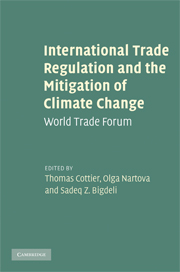Book contents
- Frontmatter
- Contents
- Contributors
- List of figures
- List of tables
- List of abbreviations
- Preface
- PART I Climate change mitigation: scientific, political and international and trade law perspectives
- PART II Climate change mitigation and trade in goods
- PART III Trade in renewable energy sources
- 8 Incentive schemes to promote renewables and the WTO law of subsidies
- 9 The WTO and climate change ‘incentives’
- 10 Certifying biofuels: benefits for the environment, development and trade?
- PART IV Climate change mitigation and trade in services
- PART V Climate change and technology transfer, investment and government procurement: legal issues
- PART VI Institutional challenges and the way forward
- Index
9 - The WTO and climate change ‘incentives’
from PART III - Trade in renewable energy sources
Published online by Cambridge University Press: 04 August 2010
- Frontmatter
- Contents
- Contributors
- List of figures
- List of tables
- List of abbreviations
- Preface
- PART I Climate change mitigation: scientific, political and international and trade law perspectives
- PART II Climate change mitigation and trade in goods
- PART III Trade in renewable energy sources
- 8 Incentive schemes to promote renewables and the WTO law of subsidies
- 9 The WTO and climate change ‘incentives’
- 10 Certifying biofuels: benefits for the environment, development and trade?
- PART IV Climate change mitigation and trade in services
- PART V Climate change and technology transfer, investment and government procurement: legal issues
- PART VI Institutional challenges and the way forward
- Index
Summary
The General Agreement on Tariffs and Trade (GATT) 1994 and the World Trade Organization (WTO) Agreement on Subsidies and Countervailing Measures (ASCM), as currently drafted, may not allow some of the policy choices discussed in the context of climate change, including in particular unilateral border taxes (especially as they are highly likely to be based on national values and existing availability of local resources); research and development for certain renewable energy sources; mandatory emissions permits; and so on. In addition, it should be noted that, to date, the ASCM has not proven effective in disciplining the numerous subsidies given in many countries to the production and consumption of fossil fuels. If climate change concerns had been more politically pressing when the ASCM was drafted, they would have been accommodated, together with the ‘green light’ (permitted) limited subsidies for research and development, environmental adaptation, and regional development programmes — but even those were allowed to lapse in 1999.
As Sadeq Bigdeli's paper explains, the rules of the ASCM would constrain proposals to stimulate the use of renewable energy sources (although, as he notes, there are numerous subsidies for non-renewable energy which have not been challenged in WTO dispute resolution or national countervailing duty (CVD) cases). Indeed, many proposals for energy subsidies, taxes and regulations are made with no knowledge of the ASCM rules, or indeed the WTO rules in general, or else rely on Article XX of the GATT 1994 (which does not apply to the ASCM) and/or the rather dubious dictum of the WTO Appellate Body that an ‘evolving interpretation’ can rewrite text or prior decisions.
- Type
- Chapter
- Information
- International Trade Regulation and the Mitigation of Climate ChangeWorld Trade Forum, pp. 193 - 196Publisher: Cambridge University PressPrint publication year: 2009
- 2
- Cited by



